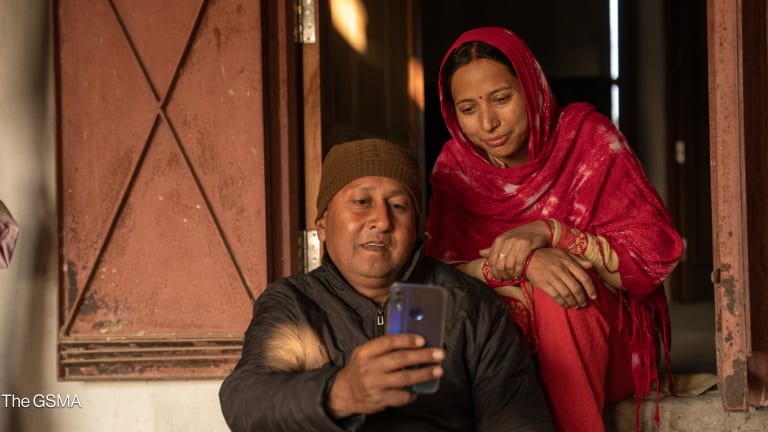
The COVID-19 pandemic has led a record number of women in South Asia and other low- and middle-income regions to use mobile internet services for the first time.
This is partly due to there being more “social justification” for women to use online services — for example, to help their children access virtual learning services amid lockdowns, said Claire Sibthorpe, head at Connected Women, Connected Society and Assistive Tech.
“Their male gatekeepers are allowing them to go online,” Sibthorpe said Wednesday at a virtual roundtable organized by GSMA, an industry group that represents mobile network operators worldwide.
With 112 million more women using mobile internet last year, women in low- and middle-income countries are now 15% less likely than men to use mobile internet, down from 20% in 2019.
“[Key barriers to smartphones] are the same for men and women, but faced more acutely by women, because of structural inequalities and structural norms.”
— Claire Sibthorpe, head, Connected Women, Connected Society and Assistive TechSouth Asia is driving this global increase, Sibthorpe said in a virtual roundtable discussing the findings of GSMA’s “The Mobile Gender Gap Report 2021,” which launched Thursday. In 2019, the region had the most significant gender gap, with women 50% less likely than men to use mobile internet, but that rate has fallen to 36%, putting the region on par with sub-Saharan Africa.
For companies such as Safaricom, the Kenyan mobile network operator, closing the mobile gender gap is good for business as well as society.
“M-Pesa, in particular, has had a major impact on financial inclusion, and also financial empowerment for women,” said Peter Ndegwa, CEO at Safaricom. M-Pesa is a mobile money service that began in Kenya and has since expanded to other countries.

Among Safaricom’s efforts to eliminate the gender gap by 2023, he said, is Maisha Ni Digital, or Life is Digital, a campaign launched in partnership with Google to drive access to smartphones and mobile internet.
GSMA is not just focused on mobile phone ownership but also on smartphones, which enable mobile internet usage.
“The type of phone you own makes a big difference,” Sibthorpe said.
From our archives:
► The mobile industry seeks partners to help close the gender gap
► Q&A: GSMA director general on how to partner with the mobile industry
Eighty-three percent of women in LMICs own a phone, according to GSMA. It is the primary way that women access the internet. In addition, women are more likely than men to access the internet exclusively via mobile, meaning there is a disproportionate benefit of increasing their access, GSMA says. Still, only 58% of women in LMICs use mobile internet.
Key barriers for smartphones include handset affordability, literacy rates, relevance of content, and digital skills.
“They are the same for men and women, but faced more acutely by women, because of structural inequalities and structural norms,” Sibthorpe said.
Another major reason for the progress in South Asia is the increased affordability of handsets and data. For example, Jio, an Indian mobile data network service provider, launched a low-cost, 4G-enabled smartphone available for under $10 and has large data plans available for less than $2 a month.
The company is a partner in GSMA’s Connected Women Commitment Initiative, which launched in 2016, and asks mobile operators to increase the proportion of women in their customer base for mobile internet and mobile money services, Sibthorpe said.
Jio’s low-cost handset is designed for first-time internet users. It looks similar to a feature phone, supports 20 languages, and comes pre-installed with content. The company has also recruited women to distribute its devices, which is one of GSMA’s 10 recommendations to reach 50 million more women through mobile phone services.
Opinion: COVID-19 recovery provides a unique opportunity to close the gender gap
In light of widening gender inequalities, policymakers across the globe need to ensure an inclusive recovery — one that makes gender equality core to building back better. Here's what needs to happen.
Ndegwa said he sees opportunities for shared learnings between South Asia and Sub-Saharan Africa, where progress on the gender gap for mobile internet usage has stagnated at 37%. He mentioned that two of his colleagues just returned from a trip to Thailand and Indonesia.
But while companies do have a role to play, Sibthorpe called for partnerships between companies, governments, and international organizations to drive costs down further.
For example, governments can rethink taxes on mobile network devices and services.
“We need creative financing mechanisms,” Sibthorpe added. “If you’re really poor, even if you get a handset down to $10, it still costs a lot for someone who makes under $1 a day.”
While the gender gap has decreased, there are still 234 million fewer women than men who access the mobile internet, according to GSMA’s report.
While the COVID-19 has enabled more women to use mobile internet for the first time, moving forward, handset affordability could become an even greater barrier for people who are dealing with the economic consequences of the pandemic, she said.
Update, June 17, 2021: This article has been updated to reflect the figures in “The Mobile Gender Gap Report 2021.”








